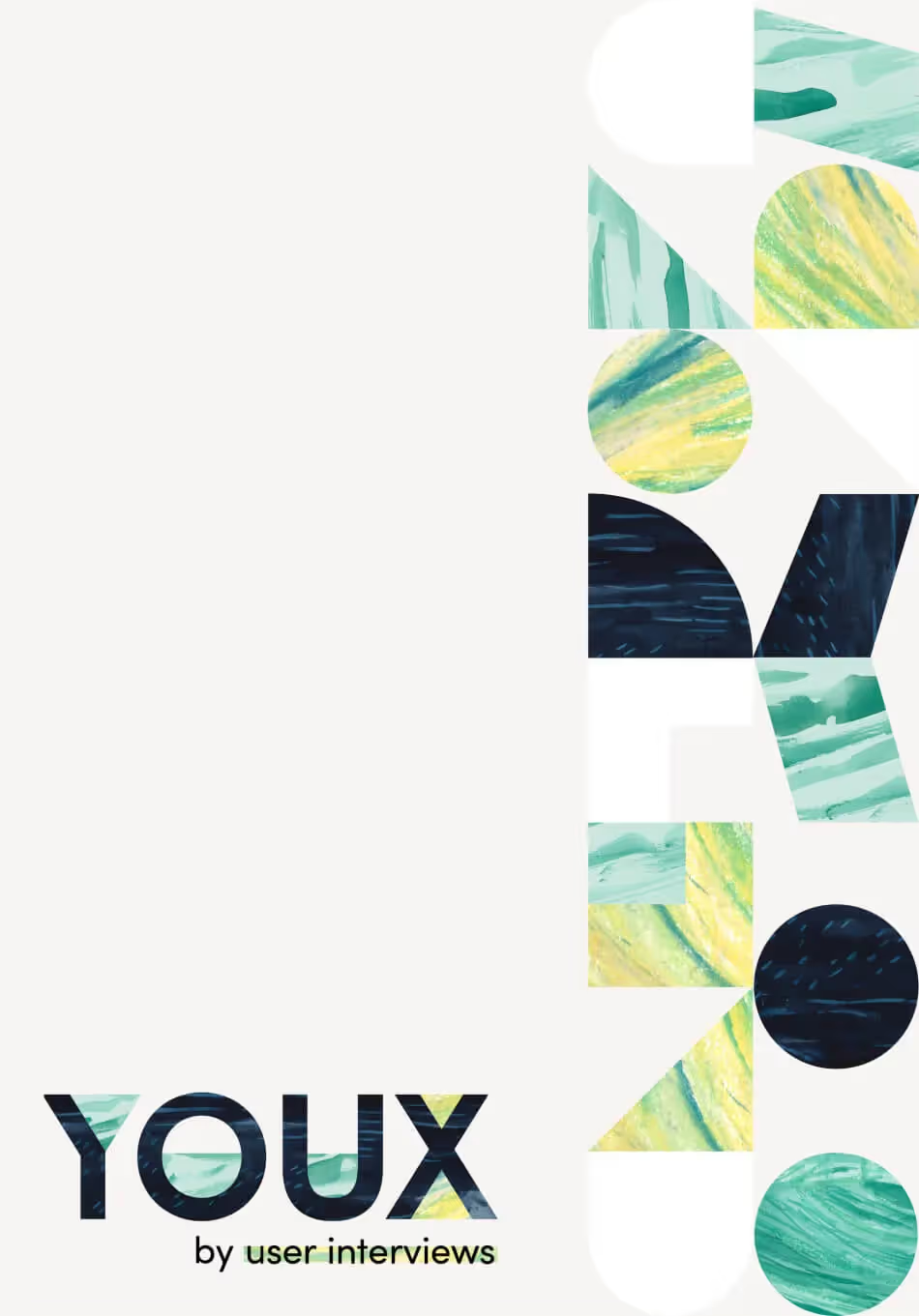Imposter syndrome seems especially present in the UX community. There’s always more to discover, and with more questions comes more uncertainty.
Self-doubt can affect anyone despite their experience or skill set, and recent mass layoffs within the industry can bring even more insecurity.
In this panel from YouX 2023—User Interviews’s inaugural virtual conference focused on self-care for researchers—Tiffany Eaton, Nikki Anderson-Stanier, and Fredrick Royster have a frank discussion on imposter syndrome—how to address it, what to do when imposter syndrome meets real-life failure, and how to pivot from challenges to opportunities.
🎥 Watch the panel recording
📌 About the panelists: Tiffany Eaton, Nikki Anderson-Stanier, and Fredrick Royster
Tiffany Eaton
Tiffany Eaton is an interaction designer at Google, designing rich business communication experiences that enable users to connect brands across a variety of Google products, such as Google Search and Maps. Aside from loving all aspects of the design process, Tiffany's strengths are synthesizing research, turning insights into meaningful design, time management and collaboration.
You can follow Tiffany on Medium (tiffanyeaton) or find her at tiffanyeaton.com.
Nikki Anderson Stanier
Nikki Anderson-Stanier is a Lead User Researcher and the founder of User Research Academy where she helps user researchers grow confidence in their skills and careers.
She has over 9 years of experience in user research at a variety of companies, ranging from a tiny start-up called ALICE to the large corporation Zalando, and also as a consultant. She has led a diverse range of end-to-end research projects across the world and now owns her own company, helping others get into the field of user research.
She lives in Jersey (the original one), loves reading and writing psychological thrillers, and being outside in the garden with her cats, dog, and koi fish.
Frederick Royster
Originally from Chicago, Fredrick Royster is a UX Designer and Special Education Teacher's Aide. With 15 years of web design and front end development experience, Frederick earned his BFA in graphic design from the University of Illinois at Urbana-Champaign in 1999 and has worked in finance, educational toys, multimedia, ecommerce, and education sectors in the US as well as non-profit web design projects while living abroad in Zagreb, Croatia for 6 months.
A break from design to care for an ill parent led Fredrick back to the design world to focus on user experience, visual design, and education.
Currently, Fredrick is pursuing a masters in art education to follow his lifelong dream of encouraging more children of color to pursue fine arts and design
💬 Q&A
How would you define imposter syndrome in just a few words?
Nikki:
For me, impostor syndrome stems from a fear of not being good enough or not being capable, as well as strong feelings of self-doubt.
Impostor syndrome is the anxiety that someone will find out that you are a “fraud” and not deserving of whatever opportunities or experiences you were given.
Tiffany:
Imposter syndrome comes in different kinds of forms. It can be trying to please everyone, feeling like you need to perform in a certain way, feeling like a failure, or worse, feeling afraid of being found as a phony.
When I first started working at Google, a place that many people think highly of, I felt even more like an imposter. Hearing where folks went to school, their previous experiences, made me feel like I somehow got here randomly, and that I wasn’t good enough. I felt this a lot when I first started my job because, well, it was my first job and I hadn’t had enough experience trying to navigate my role and how I was able to contribute to the team. On top of comparing myself to other people, I felt like I needed to be perfect in everything that I did. I couldn’t make mistakes and I had to know what I was doing, or else people wouldn’t take me seriously.
In your view, why is imposter syndrome so common in the first place? What social and/or cultural forces might be driving it?
Nikki:
We all have different fears and one of those fears hugely associated with impostor syndrome is not being good enough, thus, losing everything.
We are in a culture that is about “survival of the fittest,” and if we are deemed as not good enough, we can lose out on opportunities or jobs. Because of this, we need to survive in a tough culture and industry, we can find ourselves comparing ourselves to others. With this, we can find ourselves striving to be better than others, to appear better than others, and then, when it comes down to it, second guessing whether we are actually good enough for a given job, role, or industry.
Tiffany:
I think imposter syndrome comes from unrealistic expectations that others may project onto us, whether it’s something that is reflected in the work culture (often starting in the higher layers of management) or from our personal experiences.
I think it’s also a very common human trait to compare ourselves to others, as we are social animals and used to forming groups for survival. I would argue we still do that today, but in different forms and not necessarily for survival.
From personal experience, looking at someone’s career trajectory and comparing it to mine was a way for me to evaluate my own trajectory and what skills I should continue to improve on. A big positive of imposter syndrome is that it can be used as a way to take action and to possibly improve whatever situation we might find ourselves in, as long as we don’t let the negative feelings that may come with it consume us.
Do you think we learn imposter syndrome as children? How could we unteach this or reframe the feeling at those early stages?
Nikki:
I definitely felt imposter syndrome when I was a kid. I was considered a “weirdo” by a lot of my classmates because I didn’t (immediately) conform to what was “normal” behavior. For instance, I participated in sports with boys (rather than the girls team) and primarily hung out with boys. Because of this, I felt like I was an alien in both worlds—I didn’t get along with girls and do the stuff they liked to do, but I was always never quite accepted into my friendship group with my guy friends.
I was also extremely shy in school and scared of not giving perfect answers to questions, which, when I got into honors or AP classes, led me to feeling like I was a fraud and not smart enough to be in those classes.
For me, there are definitely pangs of imposter syndrome all throughout life and I think it is important for us to be aware that others are feeling similarly to how we feel (or once felt). It’s about teaching yourself to look inwards for validation rather than seeking it outside yourself.
Do you feel that, as women in tech, you’ve had it harder and thus felt more imposter syndrome than your male colleagues?
Nikki:
For me, we all get scared, we all experience anxiety, so I believe imposter syndrome knows no gender boundaries!
How do you become your own cheerleader in situations when maybe imposter syndrome starts to creep in?
Nikki:
I love to reflect on how much I have progressed. It doesn’t even have to be within the scope of my career. I can look back on how I used to be terrible at film photography and, as I practiced and put more time into it, I got better. So I always try to, rather than comparing myself to others, compare my current self with my past self to see how much progress I’ve made.
Additionally, I always think of Pippi Longstocking’s quote, “I have never tried that before, so I think I should definitely be able to do that.” It reminds me how funny it is for us to think we should be skilled at something without even putting time into learning the skill!
Tiffany:
What I’ve learned over time in working on multiple projects with different people is that everyone is trying to figure things out and I just try to keep that in mind when I start to feel imposter syndrome.
I think the issue is that sometimes we choose not to ask for help or acknowledge our shortcomings because we are scared of someone figuring out that we are an imposter, but by not reaching out, it can cause the opposite effect of people actually thinking you don’t know what you are doing if you find yourself stuck on something.
Especially in the early stages of your career, it’s better to ask questions and acknowledge when you need help than not because not doing those things could perpetuate the imposter feeling even more and could lead to burnout (which I felt a bit of a few months into the job).
I also try to remember that it’s okay to take my time and approach a looming issue in small steps. This means not expecting perfection, especially if something is new and to ask for feedback and tips when it is work or even life related. This can save a lot of time from overthinking and letting negative energy consume your outlook.
I've recently learned about "brag documents"... do you keep a brag document or something similar?
Nikki:
I keep a smile folder on my desktop filled with nice things people have said about me :)
Tiffany:
I keep track of my projects periodically in notes or a document.
This can be anything about the design process itself (project description, challenges, constraints) to my accomplishments related to the project or personal goals I wanted to achieve from it (i.e. I created x that helped increase customer CSAT by y, I led my first design review, etc.).
This is a great way to document my progress especially as I continue to work on new projects and I forget the details of what happened in the older ones. Documenting allows me to see all the projects I’ve done over the years and to celebrate each of the wins and learning opportunities that came from them. It also serves as great resources for polishing your resume and portfolio (which you should update from time to time even if you have no intention to leave your current role).
How do you handle LinkedIn or other platforms that are constantly pushing people's achievements, does it cause imposter syndrome for you?
Nikki:
I had to learn that there is room for everyone to succeed in this world. I used to get so jealous of other people’s accomplishments and achievements and it would really bring me down. I felt this way because it was almost as if, because they accomplished something, they took away my ability to do so.
Luckily, I realized that this was not an ideal or realistic mindset. I saw that there was plenty of space for everyone to succeed at what they do and what they are skilled at. So I tried (and it took practice) to cheer for people when they succeeded and also know that I have had plenty of successes in my life, and will have plenty more.
Tiffany:
I give myself a set amount of time for using LinkedIn. It’s so easy to doom scroll on social media sites and fall into the rabbit hole of feeling like shit, especially if you go on the site without a clear intention of what you want to do on it.
When I go on LinkedIn these days, it’s usually to get a sense of what’s going on in my network and if I do see a helpful post that’s useful to me, that’s great! Otherwise, before going in, I make sure I have a general goal of what content I want to find and skip over the ones that aren’t relevant to me.
This helps alleviate some of the imposter syndrome feelings because I go in with a specific mindset of what I want to do and that everyone’s career journey will be different than mine. I think LinkedIn can be a great place to be inspired and find helpful career tips, should you go in with that mindset.
I’m a UX consultant and I have to interact with high-level stakeholders who are experts in their fields (and I’m not). I feel I’m unable to articulate my thoughts because my imposter syndrome gets in the way even though the work itself is good. Do you guys have any tips on how to get out of your own head in a situation like this?
Nikki:
Whenever I feel overwhelmed trying to articulate something, especially if I am the least expert in that concept, I first acknowledge the fact that there is nothing wrong with admitting you don’t know everything about a given topic. I also ask stakeholders to clarify or to stop you if you are interpreting something incorrectly—at least this step sets up everyone’s expectations.
Second, I recommend writing (or drawing!) some of what you want to say down on paper (or digitally) to try to organize your thoughts. I do this a lot when I am having a hard time figuring out how to say something. Writing helps me organize my thoughts into a cohesive narrative and then I am able to practice before getting in front of my stakeholders!
How do you build a support system (especially in a small org without other UX/CX-ers)?
Nikki:
First and foremost, ask for help or ask for whatever it is that you need. Often we can feel stuck on something or that we need help, but we can forget that the number one step forward is to actually ask for it.
Tiffany:
I think it’s important to be honest and open about your feelings. This can mean being transparent when you need help with something or if you are unclear about what needs to be done.
A senior designer I worked with once said that it’s totally okay to acknowledge you don’t know something and let them know you can get back to them later. By being honest, other people won’t need to hold the unrealistic expectation that they need to know everything and I feel like that feeling spreads throughout.
It’s also important to acknowledge other folk’s feelings and to practice wellbeing. This can include checking up on other folks to ask them how they are doing and how you can best support them during this time. I think this is especially important from a leadership POV as they are the ones who influence the overall work culture. If they are transparent and afraid to share things, everyone else will follow.
I also think building a support system can start from your working relationships. As the sole designer on the product I work on, most of my daily interactions come with engineers and product managers. I’ve become friends with some engineers when we worked on products together and we end up scheduling meetings where we just chat about general things inside and outside of work. The trust that we built while working together translated into feeling comfortable enough to confide with each other.
As a manager, how do you build a culture that isn’t focused on perfectionism yet still satisfies client/stakeholders’ requests?
Nikki:
Retrospectives! As a manager, I am obsessed with retrospectives. Within these wonderful meetings, we can simultaneously talk through what amazing things we accomplished (and give celebrations) as well as how we would improve next time.
I also always give my reports the chance to talk through their blockers or difficult situations they are having without any guilt or expectation to already have fixed them. I model this through sharing difficult situations I’m in or have encountered in the past.
I operate on a high level of transparency and vulnerability because I hope if demonstrate these traits, others will feel safe to do so.
Also, if my stakeholders or clients expect perfectionism from my teams, I would have a lengthy talk with them on unrealistic expectations :) and ensure we are aligned on what they can expect from my team—greatness, yes. Perfection, no.
Any unique considerations for imposter syndrome working 100% remotely?
Nikki:
I actually found my imposter syndrome worsened when I started working 100% remotely because I had an inability to separate work and personal life. I didn’t actually see people struggling, I couldn’t just casually chat with a colleague or work friend about a problem I was having, and these conversations didn’t come up naturally during something like a group lunch because, well, there was no group lunch! Instead, I just sat in front of the computer, churning out more work, which wasn’t sustainable.
Three things really helped me:
- Taking at least two intentional breaks during the day—lunch break away from the computer and an afternoon break when I am feeling a bit drained. I try to go outside during this time, but if that doesn’t work, I make sure I am not on my computer.
- Celebrating my own successes at the end of every day. I am a ‘check off the to-do list’ person, I love progressing forward and a checklist is great for me. But something that helped me feel less like an impostor was celebrating 1-3 successes from that particular day to close out my day. That became my end-of-day ritual so I would end every day reflecting on 1-3 things I did super well, ending on a high and reminding myself why I was qualified to be doing what I was doing
- Having a support system and things to do outside of work. I am a fiction writer, board game and video game player, Cricut enthusiast, and Pilates lover. I challenge myself in all these different areas and also use a lot of my hobbies to relax.




_1.avif)














